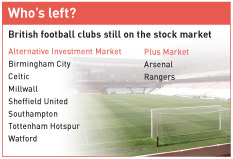AGMs can be difficult at the best of times, but for IROs at UK football clubs, its even more problematic dealing with disgruntled fans
The sight of fans on Liverpool Football Club’s iconic Kop stand bearing a banner with the slogan ‘Yanks out, Dubai in’ was an unquestionable sign the game has changed. The ‘Yanks’ are Liverpool’s current owners Tom Hicks and George Gillett, while Dubai refers to Dubai International Capital, one of the Gulf state’s investment funds, which is rumored to be interested in taking over the club.
‘Fans are becoming more interested in the financial side and are probably more astute than people give them credit for,’ notes Dan Jones, a partner in the sports business group at accountancy giant Deloitte.
Strangely, though, the rise of the market-savvy supporter comes after the heyday of the publicly listed football club has gone. Eleven UK football clubs floated on the London Stock Exchange’s main market or its Alternative Investment Market (AIM) between June 1996 and August 1997, on the back of a massive broadcasting deal with Rupert Murdoch’s Sky TV. Now, however, there are no clubs left on the main board, just seven on AIM and two on the Plus Market, the junior exchange formerly known as Ofex.
Football analysts say that, while there was big money to be made out of the Premier League – the richest domestic football competition in the world – it was spent on massively inflated player wages.
‘Instead of rewarding shareholders, the people who ran the clubs decided to reward their employees disproportionately,’ explains David Pope, a leisure analyst at stockbrokers Brewin Dolphin, who used to cover Manchester United before it was taken private by US sports tycoon Malcolm Glazer.
Loyal supporters
All the clubs on the stock market are controlled by one owner or group of backers. Yet IR is still a challenge for them because most have thousands of small shareholders, the vast majority of whom are also fans.
‘For the retail shareholders, it’s as much an emotional investment as an economic one,’ notes Naz Sarkar, director of investor services at Computershare. ‘They probably made a small investment just to have a share certificate to hang in the living room.’
According to Computershare – the then registrar – when Glazer bought out Manchester United in 2005, thousands of small investors refused to return their share certificates. They were willing to miss out on hundreds of pounds just to hold on to a piece of paper.
With that sort of attachment, it’s not surprising football clubs attract more investors to their AGMs than any other listed firms. Sheffield United, which plays in the Championship, one rung below the Premier League, had 450 shareholders at its meeting in November. That’s around 5 percent of the club’s 9,500 investors.
‘Our shareholders tend to ask questions in a sensible fashion,’ says Simon Capper, financial director at Sheffield United. ‘They might ask why we haven’t bought a new midfielder but we don’t usually get offensive questions challenging the parenthood of directors.’
Like most listed companies, Sheffield United gives shareholders the opportunity to ask whatever they like. But some clubs, like Plus-quoted Arsenal, prefer to have more control of the agenda and vet their questions in advance.
That practice is frowned upon by Arsenal’s North London rivals Tottenham Hotspur (Spurs). ‘There are no rules in terms of questions,’ notes a spokesperson for Spurs. ‘People should be allowed to ask what they want. The Spurs approach is to do things in a very businesslike manner, which is vital given that we have 26,000 shareholders.’
Reading the rule book
While football clubs are governed by the same stock market regulations as any other company, it can be much more difficult for them to stay within disclosure guidelines given the high levels of speculation and the tendency for leaks in the sporting world.
The UK regulator, the Financial Services Authority, has written to listed football clubs in the past, reminding them of their duty to release market-sensitive information in the proper fashion.
Capper insists that while it can be a fine balance, he’s well aware of his obligations to the market. ‘If I had responded to every rumor that former manager Bryan Robson (who departed in mid-February) was leaving, I would have had to put out an announcement every three days since August 2007,’ he explains. ‘But because people talk so much, you have to be pretty quick about getting out regulatory announcements when they’re needed.’
With little liquidity, Sheffield United is considering de-listing its shares from AIM – a move that would reduce the regulatory burden. But Jones believes it would be unwise to assume that listed football clubs have fallen out of fashion for good. ‘All the current private owners are financial buyers and will want an exit at some stage,’ he concludes. ‘If they can demonstrate they can make growing profits, they will be welcomed back to the market.’










